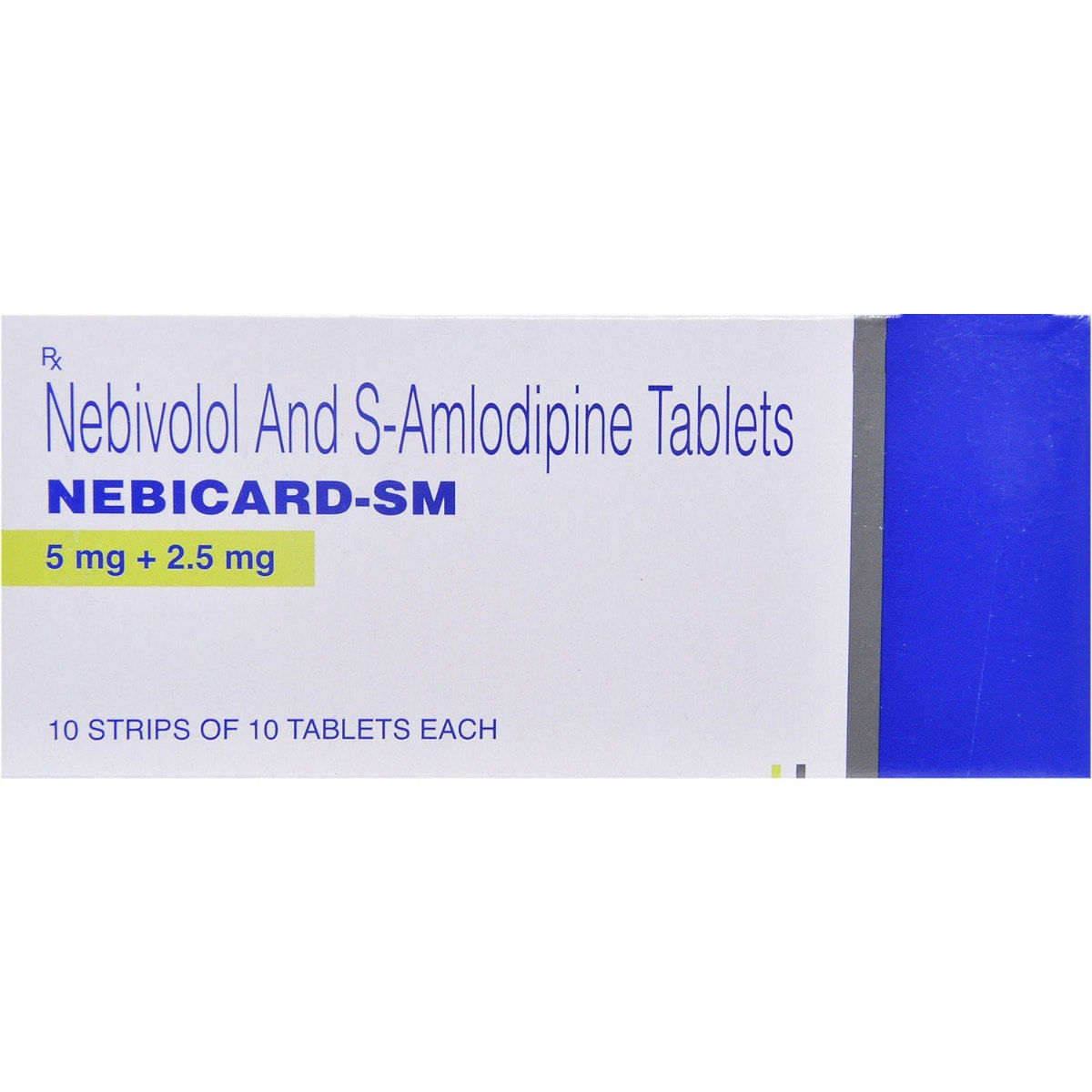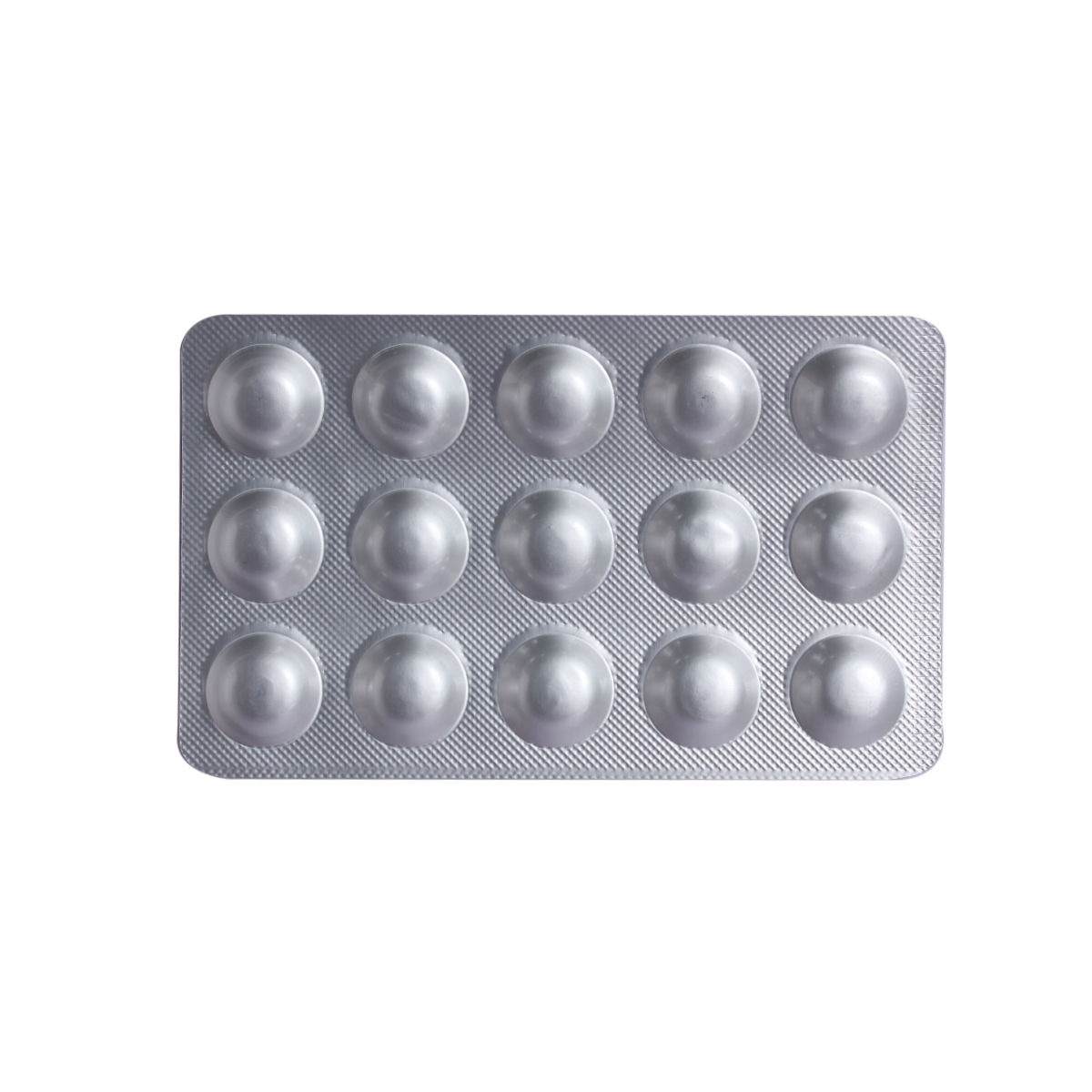Nebivolol+s Amlodipine
About Nebivolol+s Amlodipine
Nebivolol+s Amlodipine is used to treat high blood pressure and reduce the risk of heart attack or stroke. Hypertension, or high blood pressure, is a chronic condition in which the blood's force against the artery wall is high. As a result, it leads to heart disease, irregular heartbeat, and other complications. Nebivolol+s Amlodipine lowers your blood pressure and reduces the risk of having a stroke, a heart attack, other heart problems, or kidney problems in the future.
Nebivolol+s Amlodipine is a combination of S Amlodipine (calcium channel blocker) and Nebivolol (beta-blocker). S Amlodipine acts by relaxing the blood vessels reducing the heart's workload, and making the heart more efficient at pumping blood throughout the body. Nebivolol helps in relaxing the blood vessels by blocking the action of certain natural substances in the body.
Take Nebivolol+s Amlodipine as prescribed by your doctor. Depending on your medical condition, you are advised to take Nebivolol+s Amlodipine for as long as your doctor has prescribed it. Some people may experience headaches, feeling exhausted, and swollen ankles. Most of these side effects of Nebivolol+s Amlodipine do not require medical attention and gradually resolve over time. However, if the side effects persist or worsen, please consult your doctor.
It is advisable to drink plenty of fluids while taking this medicine to overcome muscle weakness, dry mouth, and extreme thirst. Do not take grapefruit or grapefruit juices with Nebivolol+s Amlodipine as it can increase the concentration of Nebivolol+s Amlodipine in the blood and worsen its side effects. Please inform your doctor if you have had an allergic reaction to Nebivolol+s Amlodipine, are pregnant, plan to get pregnant, are breastfeeding, have liver disease, kidney disease, heart failure, diabetes, a heart valve problem, or heart attack. Reducing the amount of table salt will happen.
Uses of Nebivolol+s Amlodipine
Medicinal Benefits
Nebivolol+s Amlodipine is a combination of two medicines: S Amlodipine and Nebivolol, which help lower raised blood pressure effectively. S Amlodipine, a calcium channel blocker that acts by relaxing the blood vessels. This reduces the heart's workload and makes the heart more efficient at pumping blood throughout the body. Nebivolol (beta-blocker) helps in relaxing our blood vessels by blocking the action of certain natural substances in your body. This lowers your blood pressure and reduces your risk of having a stroke, a heart attack, other heart problems, or kidney problems in the future. This medicine needs to be taken regularly to be effective.
Directions for Use
Storage
Side Effects of Nebivolol+s Amlodipine
- Bradycardia (slow heart rate)
- Increased blood potassium level
- Cold extremities
- Gastrointestinal disturbances
- Nausea
- Fatigue
Drug Warnings
Don't stop taking Nebivolol+s Amlodipine without talking to your doctor first. Stopping Nebivolol+s Amlodipine abruptly may cause changes in your heart rhythm and blood pressure, cause chest pain, or a heart attack. Your doctor will lower your dose gradually over a period of time to help prevent these symptoms. You should not use Nebivolol+s Amlodipine if you have a very slow heartbeat, asthma, serious heart condition (sick sinus syndrome), or any heart blockage. It should not be given to children less than 6 years of age. Before taking Nebivolol+s Amlodipine, you should tell the doctor if you have any muscle disorder (myasthenia gravis, rhabdomyolysis), breathing problems (COPD, bronchitis, emphysema), low blood sugar level (hypoglycemia), low blood pressure (hypotension), depression, previous heart failure, liver/kidney disease, thyroid hormone disorder, adrenal gland cancer, or problems with circulation (Raynaud’s syndrome). Prolonged intake of Nebivolol+s Amlodipine may lead to a lowering of blood pressure. So, you must closely monitor your blood pressure if you ever have had a stroke, heart attack, or currently taking other blood pressure-lowering pills. It is advised to continue taking this drug and not stop taking it suddenly without consulting your doctor.
Drug Interactions
Drug-Drug Interaction: Nebivolol+s Amlodipine may interact with other beta-blockers (acebutolol, atenolol, bisoprolol, carteolol, esmolol, metoprolol, nadolol, sotalol), causing a dangerous drop in the heart rate. It also reacts with other anti-hypertensive drugs (aliskiren, amiloride, enalapril, captopril, quinapril, diltiazem). Besides this, Nebivolol+s Amlodipine should not be used with other asthma medications (theophylline, aminophylline), potassium-rich supplements, or other painkillers (ibuprofen). If you are using these medicines, tell your doctor before taking Nebivolol+s Amlodipine.
Drug-Food Interaction: Nebivolol+s Amlodipine is known to interact with grapefruit and protein-enriched foods. Using Nebivolol+s Amlodipine together with ayurvedic, homeopathy, Unani, herbal supplements, or any other OTC items may decrease the effects of Nebivolol+s Amlodipine. Hence, it is better to maintain at least 2 hours gap between the administration of Nebivolol+s Amlodipine and these products.
Drug-Disease Interaction: Nebivolol+s Amlodipine should not be given to people with diabetes, thyroid disease, asthma, cardiogenic shock (when the heart fails to pump required blood to the body), heart valve problem (stenosis), low blood pressure (hypotension), coronary heart disease, liver disease or heart failure.
Drug-Drug Interactions Checker List:
Safety Advice

Alcohol
unsafeYou are recommended not to consume alcohol along with Nebivolol+s Amlodipine to avoid unpleasant side-effects.

Pregnancy
unsafeNebivolol+s Amlodipine should not be taken until prescribed. Nebivolol+s Amlodipine can have some harmful effects on the baby (fetus); your doctor will weigh the benefits and any potential risks before prescribing it to you. Please consult your doctor.

Breast Feeding
cautionNebivolol+s Amlodipine is usually not recommended in breastfeeding mothers. Limited human data available suggests that the drug does not do any significant harm to the baby. Consume only if benefits outweigh risks.

Driving
unsafeIt is not recommended to drive after taking Nebivolol+s Amlodipine as it may occasionally cause drowsiness or fatigue.

Liver
cautionNebivolol+s Amlodipine to be taken with caution, especially if you have a history of liver diseases/conditions. The dose may have to be adjusted by your doctor.

Kidney
cautionNebivolol+s Amlodipine to be taken with caution, especially if you have a history of kidney diseases/conditions. The dose may have to be adjusted by your doctor.

Children
unsafeNebivolol+s Amlodipine is not recommended in children below the age of 6 years. The safety and efficacy of Nebivolol+s Amlodipine in children have not yet been established.
Habit Forming
Diet & Lifestyle Advise
Keep your weight under control with BMI (Body Mass Index) 19.5-24.9.
Do regular physical activity or exercise for at least 150 minutes per week, or about 30 minutes most days of the week. Doing this can help you to lower your raised blood pressure by about 5 mm of Hg.
Opt for a diet rich in whole grains, fruits, veggies, and low-fat dairy products.
If you are taking alcohol, then only one serving for women and two servings for men is advisable.
Quitting smoking is the best strategy to lower the risk of heart disease.
Avoid chronic stress as it can raise your blood pressure. Try to enjoy and spent time with your loved ones to cope with stress and practice mindfulness techniques.
Monitor your blood pressure daily and if there is too much fluctuation, then immediately contact your doctor.
Try to include heart-healthy omega 3 fatty acids containing food drinks in your daily diet. You can also use low-fat cooking oil like olive oil, soybean oil, canola oil, and coconut oil to lower your elevated blood pressure.
Special Advise
Limit intake of sodium chloride (table salt) in your daily diet to 2300 mg per day or less than 1500 mg is ideal for most adults.
Patients Concern
Disease/Condition Glossary
Hypertension: It is a chronic condition when blood pressure is too high. This condition can lead to hardened arteries (blood vessels), decreasing the blood and oxygen flow to the heart. Blood pressure is the measurement of the force that our heart uses to pump blood to all parts of the body. Raised blood pressure can cause chest pain (angina) and heart attack (when the blood supply to the heart is blocked). Additionally, high blood pressure also causes brain damage (stroke) and kidney failure. High blood pressure can be diagnosed with the help of a blood pressure monitor or sphygmomanometer. Systolic pressure is the pressure when the heart pumps blood out. On the other hand, diastolic pressure is when your heart is at the resting stage between heartbeats. If your blood pressure is 140/90 mm of Hg, it means the systolic pressure is 140 mm of Hg, and diastolic pressure is 90 mm of Hg. Ideal blood pressure should be between 90/60 mm of Hg and 120/80 mm of Hg.
FAQs
Nebivolol+s Amlodipine is used to treat high blood pressure and reduce the further risk of heart attack or stroke.
Nebivolol+s Amlodipine is a combination drug containing, S Amlodipine (calcium channel blocker) and Nebivolol (beta-blocker). Both relax the blood vessels, which lowers your blood pressure and reduces your risk of having a stroke, a heart attack, other heart problems, or kidney problems in the future.
Your doctor may probably tell you to stop taking Nebivolol+s Amlodipine as it lowers blood pressure (hypotension) when combined with general anesthesia before surgery. So, please inform your doctor before surgery if you are taking Nebivolol+s Amlodipine.
Usually, Nebivolol+s Amlodipine is prescribed for a long term or life long treatment for hypertension (high blood pressure). You should follow the doctor's advice and take it until your doctor tells you to stop. Suddenly stop taking Nebivolol+s Amlodipine may raise your blood pressure and increase your risk of a heart attack.
Yes, Nebivolol+s Amlodipine is known to cause ankle swelling. Please try to keep your feet up when sitting for long hours. If the problem persists still, consult your doctor and do as advised.
Yes, Nebivolol+s Amlodipine can cause dry mouth. Therefore, it is always advised to increase fluid intake while taking Nebivolol+s Amlodipine. If you still feel excessively thirsty, please consult your doctor and do as advised for best results of Nebivolol+s Amlodipine.
Common side effects of Nebivolol+s Amlodipine may include, headaches, feeling exhausted, and swollen ankles. Most of these side effects of Nebivolol+s Amlodipine do not require medical attention and gradually resolve over time. However, if the side effects persist or worsen, please consult your doctor.
Yes, you can take Nebivolol+s Amlodipine with food. It will not affect the medication's effectiveness.
Swallow it as a whole with a glass of water. Do not crush, chew, or break it.
The dosage of Nebivolol+s Amlodipine will depend on your individual needs and medical history. Your doctor will prescribe the appropriate dosage based on your blood pressure levels and other factors.
No, Nebivolol+s Amlodipine is not an antibiotic medication. Nebivolol+s Amlodipine belongs to antihypertensive class medication.
Avoid salty foods, red meat, processed meats, and foods high in saturated and trans fats. These can worsen high blood pressure. Limit alcohol and caffeinated beverages.
Yes, it is used to treat high blood pressure and reduce the risk of heart attack or stroke.
Nebivolol+s Amlodipine is a combination of two medicines: S Amlodipine and Nebivolol, which help lower raised blood pressure effectively. S Amlodipine, a calcium channel blocker that acts by relaxing the blood vessels. This reduces the heart's workload and makes the heart more efficient at pumping blood throughout the body. Nebivolol (beta-blocker) helps in relaxing our blood vessels by blocking the action of certain natural substances in your body. This lowers your blood pressure and reduces your risk of having a stroke, a heart attack, other heart problems, or kidney problems in the future.
Unhealthy diet can cause high blood pressure. Too much salt, unhealthy fats, and processed foods can increase your risk. Eating fruits, vegetables, and whole grains can help lower blood pressure.
Elevated blood pressure is blood pressure that is slightly higher than normal. If your blood pressure is between 120/80 mmHg and 129/80 mmHg, you have elevated blood pressure.
Risk factors that can increase your risk of high blood pressure include health conditions, your lifestyle, and your family history. Some of the risk factors for high blood pressure cannot be controlled, such as your age or family history. But you can take steps to lower your risk by changing the factors you can control.




